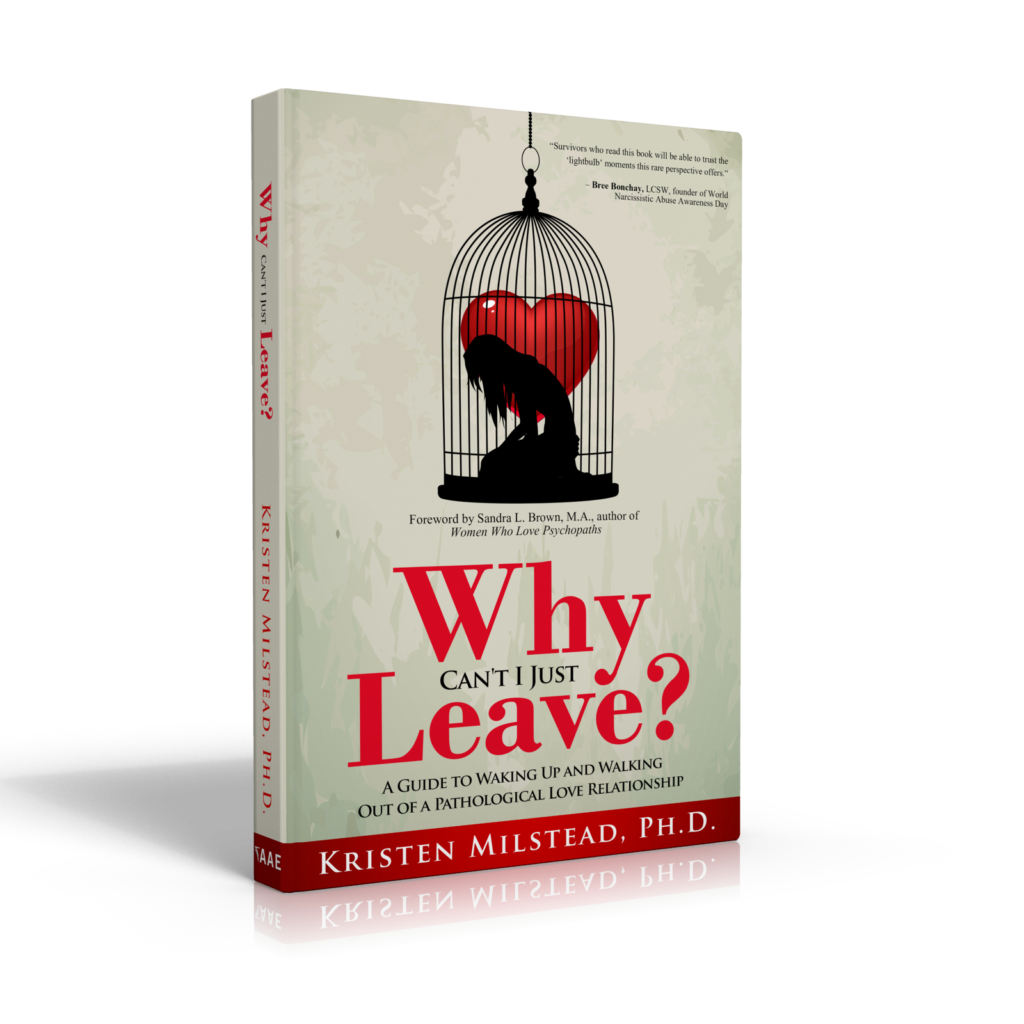Relationships with narcissists are not like normal relationships in so many different ways that it’s difficult to keep track. It’s no wonder that we’re left wondering why it’s so hard to get over narcissists once the relationships end. Putting the reasons into words, however, can help us to understand why it takes so long to get over the relationship so we can give ourselves more self-compassion as we work on moving on after narcissistic abuse.
Twelve Reasons It’s So Hard to Get Over a Narcissist
1. The Relationships Are More Intense.
Our lives were often lived on the edge. There were highs and lows. Everything was magnified, dramatic, grandiose. We may have felt like Dorothy living in Oz. Everything was in vivid technicolor–but some of it was a gruesome nightmare where we kept narrowly escaping attacks in dark forests. Beautiful and awful, and we lost sight of how to get home.
2. There Were Times When the Narcissist Was Upset with Us For Things That Seemed Rather Normal.
Seemed. No, they were normal. It’s pathological to scream at people for having friends of the same gender or for saying, “No,” that you’d not care to do something. But over time, we become conditioned to it and lose sight of what normal is.
3. Our Lives Were Often Under a Ridiculous Amount of Control.
What’s your craziest “I’m in a cage story?” I don’t know if I can choose just one, but one example is when my ex-boyfriend took a shower in my apartment and began examining the towels in the bathroom for signs of stray hairs that he believed might belong to another man. He found a long red one and insisted it was evidence that another man had been in the apartment when it was obvious it matched my roommate’s hair color and texture and spent the next hour grilling me about what I’d been doing. The level of anxiety that amount of unavoidable instability over our own lives or personhood instills becomes crippling.
4. We Allowed or Did Things We Wouldn’t Have Under Any Other Circumstances.
They slowly erode our boundaries for what we will accept. Did you find out you were the other woman or the other man? Or one of several. Never would have been in that situation in a million years. Did you cheat on someone yourself? Get involved in things you never would otherwise have done–and then find yourself in a situation where the narcissist threatened to blackmail you with it? Find your personality changing? Were you behaving in ways that didn’t make sense–saying crazy things, feeling emotions you didn’t understand? This was all a matter of survival, but once it’s all over, whatever happened we have to understand and deal with it.
5. We Were Gaslighted and Lied to So Much We Lost Touch with Reality.
They gaslight us about things they said, things that we said, things we saw, things other people said, our experiences of certain events and whether we have the right to feel a certain way (“You’re too sensitive! You take this too seriously That didn’t even happen.”). They lie about more serious things: their names, their jobs, where they came from, their pasts. The stories change, morph, and we begin to doubt our own minds–did we hear that detail wrong? It was just one tiny detail. Right? Why would they lie about that? We may not even know how we fit into the world anymore because they were so dominant in our lives.
6. We Found Ourselves Defending The Narcissist or Keeping Things Hidden That They Were Doing.
Speaking of lying, we covered up what they were doing because it didn’t make sense and because they pulled us deeper into their reality. By repeating their stories or stating things the way they would have wanted, it wrote and rewrote the present and the past until we no longer had our own version of events. Part of recovering is reclaiming our narratives and understand what really happened. Survivors often talk about what happened over and over again, telling the story as if they are obsessed. We are only trying to reaffirm our own identity once again by sorting out facts that had been erased.
7. There Probably Wasn’t Any Closure.
The breakup was probably abrupt, with either the narcissist leaving in a horrible fashion that left us reeling or with us having to leave in a manner that was either messy or that left no trace. There is no basic agreement on what the relationship meant. Any of the ways in which the relationship may have ended jolt us completely out of the narcissist’s world harshly and leave us with so many questions.
8. We Don’t Understand Who The Narcissist Really Was Because Their Behavior Didn’t Make Sense.
All those questions haunt us and may take over our thoughts. Did they ever love us? Did they know they were hurting us and, if so, did they hurt us on purposes? What was it all for? Why do they seem to hate us so much? Is there anything we could have done to make it turn out differently? No matter how many ways we flip the puzzle over in our heads, we still can’t figure out who they really were. It’s like they were two completely different people and it feels like a riddle we’ll never solve, but we can’t stop thinking about it.
9. We Can’t Understand Ourselves Either.
We not only don’t understand the narcissist, but we also don’t understand ourselves and may feel a lot of shame about our own actions. It’s easy to feel a sense of shame not only about those actions we took that were overtly out of character but in general about the fact that it took us so long to leave. It feels so puzzling trying to understand what was keeping us in a relationship where we were treated so badly. We may feel like a complete stranger to ourselves.
10. We Were Betrayed By Them on So Many Different Levels.
They may have used the information they learned about us in confidence to hurt us in a breathtaking number of ways. They lied and cheated and then rubbed it in our faces, doing everything they could to try to make us intentionally feel worthless. There’s just so much pain and trauma. We may have repressed it, but once everything they’ve done starts to sink in, we may realize how deeply we have been violated.
11. We Have Lost So Much More Than Just the Relationship.
This wasn’t just a breakup. They preyed upon our innocence and somewhere along the way, we lost a small part of ourselves. We feel spiritually stripped of life, and we may feel bled out emotionally. It’s as if they have seen inside of our soul and then cut it right out of us–intentionally. We may have lost our health or there may have been a financial loss as well. We may have lost our jobs or had to move. The losses are difficult to tally, but one thing is for sure: our lives will never be the same, and so one thing we lost is the life we had before we ever met them.
12. No One Understands What We ‘re Going Through After the Relationship.
We may feel completely alone, as almost no one understands narcissistic abuse. Many people likely react in one of the following ways:
- IT DIDN’T SEEM AS IF ANYTHING WAS WRONG AT THE TIME: “If it was so bad, why were you defending him/why didn’t you leave?” They don’t understand the nature of the abuse and how confusing it is while you’re in it.
- THAT DOESN’T SOUND ABUSIVE: “It doesn’t sound so bad—okay, he cheated, so what? Or okay, he’s a little controlling but [revert back to the previous excuse].” You can’t explain the totality of what happened, or they think you’re a strong person or you’re exaggerating now that it’s over.
- ARE YOU SURE IT WASN’T A TWO-WAY STREET? “You were okay one minute and crying the next. You defended him one minute, wanted out the next. That’s not very stable. Sounds like both of you were part of the problem.” The trauma bonding aspect is completely lost on almost everyone, and people don’t understand cognitive dissonance.
Even for those who do recognize it was abusive, they often don’t understand how we were deceived and drawn into the relationship and all of the tactics the narcissist used to keep us there. It’s hard enough for us to understand it, much less explain to anyone else.
There is no particular timeline for how long it takes to get over a narcissist, but one of the most important factors is support. There remains a general lack of awareness of how narcissistic abuse operates. As a result, other people don’t understand why it can take so long to get over a one. They don’t understand that we are struggling with factors such as our perceptions of reality and the loss of practically everything that mattered to us–real or not.
Want more? Get more articles like this one delivered straight to your inbox.
Don’t forget to check out these free resources:
- Taking Your Life Back After a Relationship With a Narcissist – Recovery Toolkit
- Comprehensive Narcissistic Abuse Dictionary
- The Best Resources for Narcissistic Abuse Recovery






7 Comments
M
This is so right on. My relationship was only 2 years If that’s what you call it. It was fast and furious. On top of I suffered a nervous break down. How could I fall into this? Why? Will I have ever recover ? No one but no one understands me!!!!
Lynda
I understand honestly, I’m the same 2 years just about holding it together, I’m no contact , but took me a long time to do that, I would just keep going back occasionally to him to get some weird relief from it all the pain would disappear but the next morning I couldn’t wait to be away from him , the messages I got kept me trapped, but the gaslighting was the worse feeling ever, no closure , just found it myself n stayed away, it’s the only way.
Cindy
It is hard to get over a narcissistic abuser for all of the reasons listed in the article. I agree that the legal definition of abuse including narcissistic abuse would benefit and protect partners and children of narcissists. Each time I left my narcissistic partner I encountered so much stalking. I would block calls, texts, social media and emails and then found that would increase the driving around my house, parking at the end of the street, going into my house when I’m not home to try to find something to substantiate the delusions of someone else in my life on the computer. Then I just unblock the phone because I’d rather be bombarded with texts and calls then have him stalking me physically. Friends think blocking the phone is the best idea but they don’t realize I need to choose the lesser of the two evils. Him showing up is more difficult for me and makes me more likely to cave with hoovering as you called it in your definitions. What confuses me is when I miss him, certain things. One addition to the list under intensity of the relationship is sexual intensity. More so than any healthy relationship which is another reason it was hard to stay away even though the rest of us was so unhealthy. Also the bombardment of intensely romantic and poetic compliments, mostly related to attractiveness, yet not being valued as a person. Why do we miss the person who has harmed us, exploited us, controlled us and made us walk on eggshells with unpredictable tirades? I love his family and miss his kids and grandkids, miss sleeping beside him, I’m always told he’s suffering without me and it’s all in my control to being us back together. He has no ability to stop the abuse. 2 therapists confirmed that he can’t change at all at his age. I can now tell he truly has a lack of mental capacity to reason or be logical when I discuss the abuse. He denies it and then there’s no framework to problem solve. I won’t date anyone else, my “picker” is broken and I don’t trust my judgement. I live in a very limited area to meet people. So it’s easy to miss companionship and narcissist when there’s no one to share life with. My children and friends are wonderful and I don’t want another smothering/neglectful roller coaster. I find no adult companionship causes me to miss him. I wish he was 100% unhealthy and abusive then I wouldn’t miss anything
Ashley J Burton
I want to know how you are doing now. I feel like you feel or felt. I hope you have found peace. It’s all im striving for.
Cindy
Once again, extremely thorough and accurate list. Loss financially is devastating for me. Currently Separated fir 3 months. Divorce papers were signed 2 days ago. He offered to take them. . Now he texts he can’t drop them off at courthouse because he can’t “commit love suicide” and loves me so much he feels seasick. Sometimes I miss him which is insane! Oh and after he denied 11 years was based on sex (only moves together during short 6 month marriage) the last thing he said when he left with divorce papers, he held me tightly and said “the sex was the best ever, unvelievable.”
Katie
When are you going to help us group together and begin the process of having narcissistic abuse legally recognized AS ABUSE so that we can get protection during and after the relationship? Please….
it is legally recognized in UK now and is having a big impact on those suffering through this horrendously invisible abuse.
Thank you for all work – it’s reassuring to know I’m not alone, not imagining things.
Kristen Milstead
You’re welcome, Katie. There are already some really strong organizations and people working to group people together to make coercive control a recognized and illegal form of abuse within the United States, as it is in France, UK and other European countries. I’d like to have narcissistic abuse acknowledged as well (as would others). There are elements of it that overlap with coercive control, but are distinctive from it. We as survivors are at the threshold of recognition. See the website mission for more of how I hope to work with others to accomplish this over time. It’s a long process. Thank you for leaving a comment. -Kristen